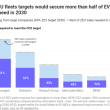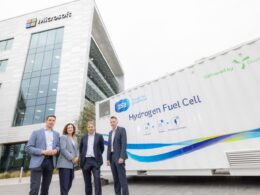BMW Group has taken its first major step into biochar-based carbon removal, retiring 25,000 tonnes of CO₂ credits (tCO₂e) in 2024 as part of its long-term sustainability strategy. The German automaker aims to offset up to 10% of its total emissions by 2050 using carbon dioxide removal (CDR) credits, according to its latest ESG report.
The credits were sourced from projects operated by Atmosfair and Firstclimate, two German project developers specialising in biochar-based carbon sequestration. Certified under the Global Biochar C-Sink standard, the credits represent BMW’s entry into engineered carbon removal, a sector gaining traction as industries look for scalable ways to achieve net-zero emissions. The standard itself was introduced in June 2024 by Carbon Standards International, refining the earlier European Biochar Certificate C-Sink framework.
According to the report, BMW has been supporting the development of permanent CO₂ sequestration methods since 2024, aiming to establish a sustainable framework for long-term emissions reductions. The company’s initial retirement of 25,000 tCO₂e biochar credits is estimated to have cost $3.25 million, assuming an average market price of $130 per tonne. Given BMW’s pre-tax profits of $11.9 billion (€10.9 billion) in 2024, this represents a small but strategic investment in carbon removal technologies.
Biochar, a carbon-rich material produced through pyrolysis, provides a long-term storage solution for carbon sequestration in soils while enhancing agricultural productivity. One of BMW’s key suppliers, Atmosfair, operates a biochar project in eastern India, capturing around 32,900 tCO₂e annually. Meanwhile, Firstclimate, in collaboration with Carbonity, runs a biochar production facility in Port Cartier, Quebec.
Looking ahead, BMW plans to retire between 46,000 tCO₂e and 57,500 tCO₂e of biochar credits across 2025 and 2026, reinforcing its commitment to scaling up carbon removal solutions. The company has pledged to cut its Scope 1, 2, and 3 emissions by at least 90% by 2050, compared to its 2019 baseline of 150.1 million tCO₂e. Offsets will only be used for emissions that “cannot be technically reduced further”, underscoring BMW’s focus on direct emissions reductions before relying on carbon credits.
With up to 10% of its total emissions targeted for removal, BMW could ultimately retire as much as 15 million tCO₂e in credits by 2050. By investing in biochar early, the company aims to support the scaling of promising carbon removal technologies and secure a reliable supply of high-quality removal credits for its long-term climate commitments.
As major corporations like BMW integrate carbon removal into their sustainability strategies, the demand for high-quality, verifiable carbon credits continues to grow. With stricter regulations and rising investor expectations, companies seeking to strengthen their net-zero pathways will need to align with scientifically robust and scalable carbon removal solutions.
BMW’s early adoption of biochar-based CDR credits signals a growing corporate shift towards engineered climate solutions, reinforcing the importance of long-term carbon market strategies in achieving global decarbonisation goals.


















